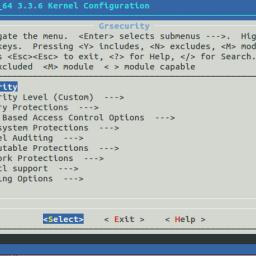Grsecurity stops issuing public patches, citing trademark abuse
 The gurus behind the popular and respected Linux kernel hardening effort Grsecurity will stop providing their stable patches to the public. In future, only paying sponsors will get access to stable patches to shore up their kernels' defenses. The test series, unfit for production use, will however continue to be available, to avoid impacting the Gentoo Hardened and Arch Linux communities. The project's full source code will still be released to the public at large, but non-sponsors will have to pick through every update to find out what's applicable to them.
The gurus behind the popular and respected Linux kernel hardening effort Grsecurity will stop providing their stable patches to the public. In future, only paying sponsors will get access to stable patches to shore up their kernels' defenses. The test series, unfit for production use, will however continue to be available, to avoid impacting the Gentoo Hardened and Arch Linux communities. The project's full source code will still be released to the public at large, but non-sponsors will have to pick through every update to find out what's applicable to them. The whole situation stems from WindRiver, a subsidiary of Intel, which "has been using the grsecurity name all over its marketing material and blog posts to describe their backported, unsupported, unmaintained version in a version of Linux with other code modifications that haven't been evaluated by us for security impact." After spending several thousand on legal fees, faced with "a huge legal team, the capability to drag out the case for years" and a threat to request "all available sanctions and attorneys' fees" were the lawsuit to proceed against them, Grsecurity decided pursuing the case through the courts was not practical.
This is in the FAQ for anyone who spent a few seconds to look for it:
* http://www.gnu.org/licenses/gpl-faq.html
"the GPL requires you to make the modified source code available to the program's users, under the GPL."
"The GPL gives him permission to make and redistribute copies of the program if and when he chooses to do so. He also has the right not to redistribute the program, when that is what he chooses."
"You can charge people a fee to get a copy from you. You can't require people to pay you when they get a copy from someone else."
etc. etc.The GPL is not revocable:
* http://www.groklaw.net/article.php?story=2006062204552163Your repeated assertions of bad faith are both incredibly lazy and utterly insane, as the GPLv2 explicitly allows modifications & derivatives, explicitly allows you to "charge a fee", and nowhere claims you must make your modified version PUBLICLY AVAILABLE. Stop pretending to be a lawyer who has any clue what he is talking about, when you're clearly unwilling to do the slightest work to investigate the validity of your own unsupported claims.
At least you managed to avoid blaming Debian or women for any of this...